Look back: Storytelling Sessions
Look back: Storytelling Sessions
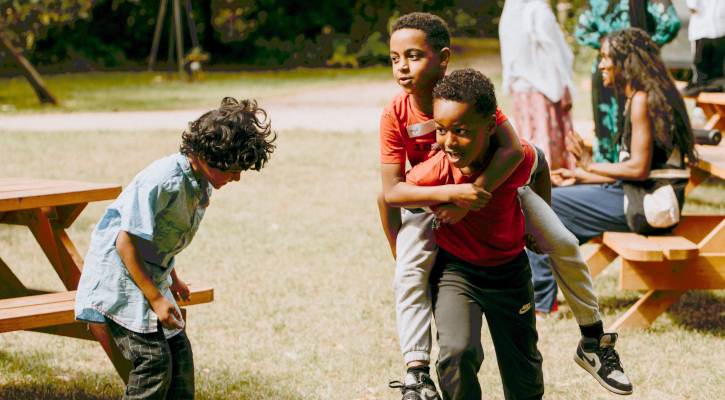
Storytelling Sessions - Image Credit: Francisco Vicaria
Over the summer, as part of our Communities and Neighbourhood's programme, we hosted a series of free storytelling and movements session for parent/carers living in or around local neighbourhood, Stapleton Road.
The sessions where developed by Hibaq and Suad, who have recently joined the Trinity Team as Community Connectors. Community Connectors activate conversations with residents living within Trinity's locality which in turn help shape activities at Trinity.
Keen to encourage local families to spend creative time together during the summer break from school, Hibaq and Suad devised a four week programme of free-to-access activities that used storytelling and movement to explore and share stories of culture and heritage. Hibaq and Suad then invited families whose children attend local primary school, Easton CE Academy (one of three schools in the Cultural Alliance) to come along.
"I’ve had a lot of things on my mind this week, but here I forget everything, I relax" - Feedback, Participant, Storytelling Sessions
During the sessions parents and children took part in singing traditional songs, creating movement and dances. Hester Welch, the lead artist during the sessions, observed that during the sessions "families explored different ways of uncovering and sharing stories, building confidence in themselves and their surroundings, and celebrating these skills".
As well as using storytelling and movement to create connections between mothers and children, the sessions allowed space for women to have 'focus time' - a space to connect and express themselves in a calm, quiet environment while their children happily worked together elsewhere, creating dances and artwork to share back to them.
Across the four week project, we welcomed 45 participants from 12 families - all of whom live within a 20min walk of the Trinity Centre.
Read more about our commitment to celebrating, platforming and developing community creativity or find out what events are coming up as part of our Community & Neighbourhoods programme, including storytelling, singing, craft and drama drop-in workshops at our September Garden Party.
In Conversation: Bethany Ley
In Conversation: Bethany Ley

Bethany Ley - Image Credit: Giulia Spadafora
As part of our in-house programme, Trinity Presents, we are pleased to be bringing Bristol-based Bethany Ley to Strange Brew on 13 Sep. Bethany will be performing their new EP, Sundial as part of a new Audio-Visual live show in collaboration with visual artist Alfie Dwyer, who recently worked with Aphex Twin creating the visuals for their 2023 tour.
We sat down with Bethany for an in-depth conversation about Sundial, exploring their creative process and what's next on their journey.
Hi! Please introduce yourself
B: Hello! I am Bethany Ley (FKA. STANLAEY), an independent producer, vocalist, and sound designer based in Bristol. I write music that explores the cross section of my background as a classical musician, with electronic production, improvisation and sound design.
"Trinity is such a big part of the tapestry of the Bristol music scene and I am grateful for the continuous support. If I step back, it’s nice to see the musical evolution in myself and the city – and that Trinity has been a constant force in that throughout the years" - Bethany Ley
You previously released music under the name STANLÆY - can you tell us the thought process behind changing your name as an artist, and how this has been reflected in your music?
B: Changing the name has felt like a natural progression of stepping into myself as an artist. I wanted to release music under a ubiquitous name that can constellate the hue of what I do in a way that makes sense to me. Stripping it back has given me a different type of excitement to explore production within my recorded and live work.
Your debut EP ‘Sundial’ was released a couple of months ago – can you tell us a little about the inspirations behind the project, the process of creating the EP and what the response has been like so far?
B: Sundial stemmed from a love and exploration of acousmatic sound design, and the visualisation of sound. The project actually started off as an imaginary OST to a sort of visual landscape, or generative video game. It then mutated and merged with structure and song-writing. Other topical inspiration was Internal Family Systems (IFS), a therapeutic model which thinks of each person having several modes of self within themselves. The response has been heart-warming. I feel grateful for Lo Recordings for taking it on to a label that it feels very at home at! Also very grateful to my friends and new people I have met and chatted to when performing these songs live!
This project has seen you working with AV artist Alfie Dwyer to create animations for Sundial, what was that process like and what do you think the visuals add to the overall experience of the EP?
B: I experience and make music really visually and recently have been writing my music alongside creating visual scores, so working with a visual artist has felt really natural; especially someone I am so close with. Alfie and I have overlaps in our interests and art, so I think our work compliments each-other well and we both get inspired by each-other when talking about ideas. I feel like visuals and sound give each-other so much, and together create something bigger than each part individually. It’s Alchemy. Putting them together in this way for my debut EP ‘Sundial’ has felt like we are able to invite people into the universe of the music in a more physical way.
You’ve been on our radar for a while now – performing at Trinity several times including at our Garden Party – what has this journey been like for you as an artist?
B: I played at The Garden Party in 2021 (Post-Covid) and we absolutely loved that show! I also played with Ishmael Ensemble as part of their ‘Visions of Light’ tour at Trinity in 2022, and most recently supporting Waldo’s Gift at Strange Brew back in March. Trinity is such a big part of the tapestry of the Bristol music scene and I am grateful for the continuous support. If I step back, it’s nice to see the musical evolution in myself and the city – and that Trinity has been a constant force in that throughout the years.
What can audiences expect from your show at Strange Brew on 13 Sep?
B: You can expect sonic and visual gemstones and crystals being gently hurled about the room. I will be playing electric harp, electronics and singing alongside a band on stage with me, whilst Alfie Dwyer performs his live bespoke visuals alongside Matteo Amadio on lights. I am so excited to be joined by musical angels James Storm (sax, synth & voice), Isla Greenwood (voice), Laura Wilson (violin) to bring to life the songs in a new and expansive way just for the Bristol show.
What’s next for Bethany Ley?
B: I am slowly working on an album or new body of work which I am excited about. I am saving up to go to Indonesia & plan to deep dive into the sound of bells, harmonics, and hopefully learn more about soundwaves in the process.
Bethany Ley will be performing at Strange Brew on Friday 13 Sep 2024 - click here to get your tickets.
Opinion: Voices in Decision-Making
Opinion: Voices in Decision-Making
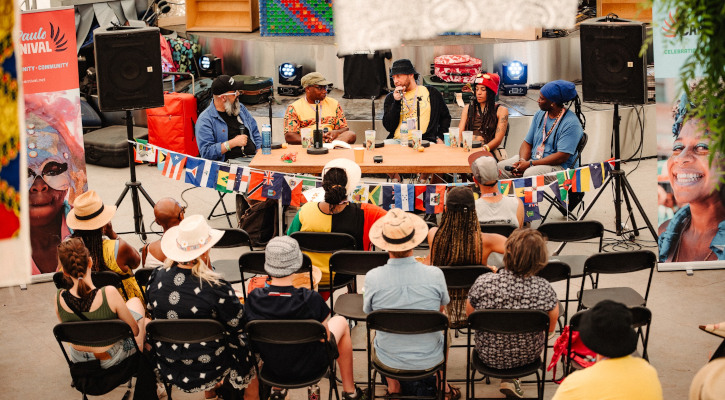
St Pauls Carnival Panel Discussion at Glastonbury Festival 2024 - Image Credit: Khali Ackford
Trinity is committed to creating ways in which citizens can take an active role in shaping arts and culture. As part of this commitment we are connecting with leading voices in the cultural sector to ask them to share their thoughts on the different civic and democratic tools that we as citizens can access. In the second in our series of opinion pieces exploring civic participation LaToyah McAllister-Jones, Executive Director of St Pauls Carnival, reflects on her experiences of using various tools to facilitate democratic decision-making.
Opinion: Voices in Decision-Making, LaToyah McAllister-Jones
I have always been attracted to work and play that enables people to have a voice. To be heard. After years of working with marginalised groups, from managing accommodation services for street homeless people to community organising in Hackney, I have developed an interest in the right to influence decisions being made about our lives.
One of the most interesting things about leading a community arts organisation is just how integral the community is to our work. St Pauls Carnival CIC is merely a custodian for the iconic event; we provide a stage and the community fills those spaces. Carnival celebrates African Caribbean talent in St Pauls and beyond as well as our culture and heritage. Our communities continue the traditions of our ancestors using music, dance and storytelling to share lived experiences and connect to our heritage. This is one of the most important things about our event: it allows us to tell our own stories, in our own words, using our voices.
In 2021, I was asked by Involve to facilitate Bristol City Council's Citizens’ Assembly supporting policy development in housing, health inequalities and transport as the city emerged from Covid. The process was new to me, and I loved the way it cut through many of the challenges that we often come up against when engaging communities:
- Participants are randomly selected, and usually aren’t experts in the central assembly topic. There is a process to ensure that all participants are able to meaningfully contribute to the discussions, and this is critical to the success of an assembly.
- The process seeks to facilitate consensus, rather than debate which tends to have a winner and a loser.
- Participants are encouraged to explore what their real priorities are and what they might be prepared to forego for those priorities.
- Assemblies bring together a diverse range of people who you wouldn’t necessarily find together in a traditional social setting. This creates an opportunity for vastly differing viewpoints to be heard and influence how others participants might think about a topic.
St Pauls Carnival are currently delivering a Citizens’ Assembly for Culture in partnership with Trinity Community Arts, Citizens In Power and West Of England Combined Authority. The idea developed just as we were coming out of the pandemic and thinking about the lessons learnt; particularly the role of community. Together, we were curious about what it would look like to use the assembly process - democratic, person-centred and thinking about strengths of a place, its people and its assets - to reimagine what the cultural offer could look like in the South West region.
Democratic decision-making allows citizens to actively contribute to the discourse that shapes their communities. We also believe culture is experienced by everyone, in many different ways, and everyone should be able to access the culture that represents them. If this is to be the ambition, it is vital that we put people at the centre of that process. This means understanding how people experience culture, what it means to them and, as cultural leaders, asking ‘how can we reflect this in our approach and programming?’
The new Labour Government expressed an interest in the use of Citizens’ Assemblies earlier this year, and the format has been used to unpack challenging issues like abortion in Ireland. The South West region is already embedding this approach into how we speak to our communities, and we are at the forefront of using assemblies to understand how we deliver for everyone, and not just those who can afford it or who have easy access to culture.
Our Citizens’ Assembly for Culture project offers an exciting opportunity to create a new approach to engaging people in the cultural life of a place. The Assembly will take place in Spring 2025 as a central programme within Culture West, funded by the West of England Combined Authority and Arts Council South West. The recommendations coming from this Assembly will become part of the regional approach to delivering a citizen-led cultural offer.
Find out more about the Citizens' Assembly for Culture project:
- Read the first piece in this series about civic participation: Edson Burton’s exploration of why voting matters
- Sign up to an online information session with the Citizens' Assembly team
- Email Imogen@trinitybristol.org.uk to join our Citizens For Culture mailing list
- Read our blogs to find out more about the Citizens' Assembly project
In Conversation: Mungo's Hi Fi
In Conversation: Mungo's Hi Fi
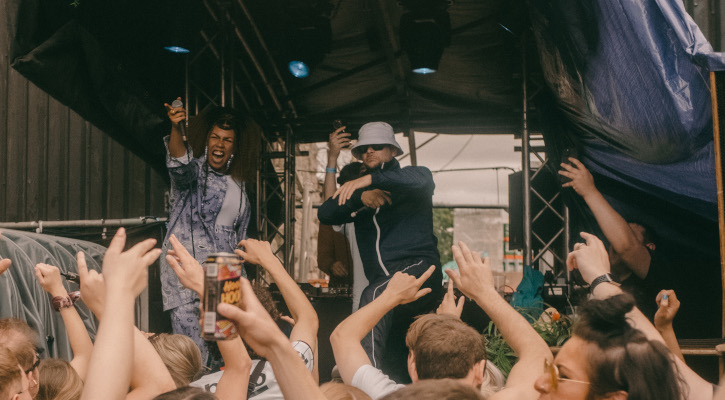
Mungo's Hi Fi performing at Sequences Festival with Eva Lazarus and Charlie Hands
We are working with Bristol-based external promoters and artists to platform local grassroots artists alongside internationally renowned musicians. Teachings in Dub have been a staple of Trinity's programme for the last 15 years, honouring Trinity's legacy as a soundsystem venue by bringing some of the best Dub soundsystem operators and MCs to Trinity with monthly events at The Trinity Centre.
Ahead of our Day Party with Teachings in Dub and Mungo's Hi Fi on Sunday 18 August, we sat down with Mungo's to chat soundsystems, summer plans, up-and-coming artists and much more.
Q: Hi! Can you introduce yourself and tell us a little about how Mungo’s Hi Fi formed?
A: Hello - we are Mungo's Hi Fi, a Soundsystem based in Glasgow and named after Glasgow's founder, St Mungo. We started collecting vinyl, playing out, organising club nights, free parties and protests in the 90s. We saw the music as part of a social movement, and developed a DIY culture around what we did, starting to build our own soundsystem at the time.
"Bristol is the capital for UK soundsystem culture at the moment, fed by the deep enthusiasm for the festival and party scene, far enough away from London to have it's own scene, but still close enough to be involved with what's going on there" - Mungo's Hi Fi
Q: Your soundsystem is pretty legendary – can you tell us how it was developed?
A: We helped out with other people's sounds to begin with, and then found some old speaker boxes discarded in a skip. We bought an old amp, fixed them up and started building from there. We had a monthly gig in a bar which we took the sound to and played music at, as well as our own promotions in an old working man's club. We used the money from these events to pump back into buying more and better speakers and amps, as well as building speakers ourselves, some of which we are still using nearly 20 years on. It has improved over the years, and we have become more experienced in every aspect of using it.
Q: How did you first link up with Stryda and Teachings in Dub?
A: I am ashamed to say I can't remember. We used to listen to their radio show and they helped promote the releases we were putting out since we founded Scotch Bonnet in 2005...so we have been in touch for around 20 years. They have always been supportive of what we do, and vice versa.
Q: You’ve been a staple of Bristol lineups for some time now – is there anything about Bristol that sets it out from other cities in terms of Soundsystem culture?
A: Bristol is the capital for UK soundsystem culture at the moment, fed by the deep enthusiasm for the festival and party scene, far enough away from London to have it's own scene, but still close enough to be involved with what's going on there.
Q: What else does the summer have in store for Mungo’s?
A: This summer is pretty crazy for gigs. It started off with tours in Australia, New Zealand, America and Canada, and since then has been a whirlwind of festivals in the UK and Europe, from Latvia and Croatia, to the depths of the Scottish countryside. It is such a privilege to be invited to these sacred gatherings of various tribes. Got to say Boomtown will be a highlight this year with our first ever soundclash with David Rodigan.
Q: Who are some reggae and dub artists you think more people should know about?
A: Tough question, which depends on how much your ear is already to the ground. Coming from Jamaica right now you have to rate Samori I and Lila Ike as bringing something fresh and exciting. I'm a big fan of Johnny Go Figure from New York who I met for the first time a couple of weeks ago. As for the UK, I love what Joe Yorke is doing right now.
Q: Anything else you’d like to add?
A: I'm really keen to find out what the next generation will bring, and to see if there are ways that those of us who have been through it all can support them, cos I know it's harder than ever to make a name for yourself, let alone a career in the music industry. We help run a project in Scotland called The Soundsystem Project where we share some of the skills we have learned in building speakers, DJing, song writing, production and everything around that with young people. It really feeds my soul to see fresh faces getting involved, feeling inspired and growing as individuals and groups through the joyful act of making music together.
Mungo's Hi Fi will be playing at our Day Party with Teachings in Dub on Sunday 18 Aug alongside Solo Banton, Housewife's Choice and more - click here to get your tickets.
Look Back: Nature in Newtown
Look Back: Nature in Newtown
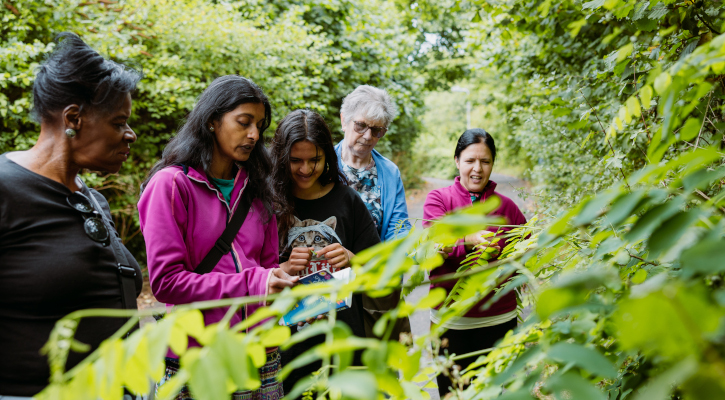
Nature in Newtown - Image Credit: Alastair Brookes
Throughout the summer, we’ve been working with our Community Connectors to programme activities for the local community. Working with Shanti Pant, our Community Connector for Newtown, we devised a programme that encouraged residents local to Newtown to spend time together, enjoying and learning about local green spaces through gentle exercise and nature walks.
“You just don’t know what is on your doorstep” - Feedback, Nature in Newtown Participant
Newtown is one of three local neighbourhoods that Trinity is working closely with over the course of this year, to develop a greater understanding of residents’ interests and experiences, and how we can offer support to share creative activity. As a Newtown resident, and nature-lover, Shanti was keen to share her experience of how spending time in nature can provide a simple way to support wellbeing and connect with others, so we worked with her to create this project.
Nature in Newtown ran for ten weeks from June - August, led by Subitha Baghirathan, and supported by Shanti. With Lawrence Hill Health Centre as the groups’ meeting point, Subitha shared a range of wellbeing exercises and activities for participants to experience including; tai chi, vagus nerve breathing, mindfulness activities and listening walks. Through rain and shine, we welcomed ten local people over the weeks, enthusiastically sharing their knowledge of the area, and learning new things from each other.
We found out that there is plenty of nature surrounding Newtown, and new places to discover too. A walk through some tunnels - shared by one member of the group - contained beautiful tiles documenting ‘The Industries and Crafts of Bristol’s Rich Industrial Heritage’, a walk along the railway path encouraged group members to use Subitha’s tree book to identify different species by their leaves, and a visit to Trinity’s garden enabled the group to meet Fleur, our garden project facilitator, who showed them around the space and talked about our volunteer programme.
Over the weeks, participants reported an increased feeling of connectedness to their local community, confidence to explore the local area, and confidence to engage with others.
For the second part of this project, we’re inviting practitioners Shanti Sherson (Wellbeing at Wellspring Settlement) and Jon Aitken (filmmaker at Watershed) to join us at Lawrence Hill Health Centre’s community garden, for Filmmaking in Newtown.
Over three sessions in September, Shanti and Jon will lead nature-based activities and help participants create simple short films together that document our connection to nature.
Guitar donated to music-making programme
Guitar donated to music-making programme
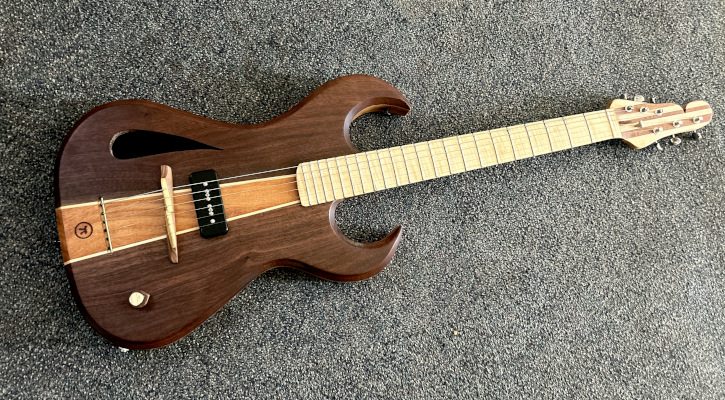
The hand-crafted guitar built by young people who attend Novalis Trust, a Stroud-based learning academy
Young people from Novalis Trust have generously donated a handmade guitar to Trinity's music-making program. This guitar was created as part of the Workbench Project, an initiative delivered in partnership with Pi Guitars.
"We are honoured to donate this guitar to Trinity Community Arts. May it inspire creativity, foster community, and bring the joy of music to all who play it. Thank you for the incredible work you do in Bristol, nurturing the arts and empowering individuals." - James Mountjoy, Novalis Trust
The guitar will be available for young people who attend music making sessions at Trinity to access and play as part of 1-2-1 sessions or the weekly drop in music-making sessions Next Gen Sounds.
The Workbench Project involves young people at the Stroud-based college, who visited Trinity last week to present the guitar to the Music Team. In addition to the donation, the young people enjoyed a tour of Trinity's facilities, including the Recording Studio and the Live Room. Novalis Trust is a Stroud based charity who operate multiple residential facilities in aid of people with learning difficulties from the age of 7 all the way up to 65.
James Mountjoy - a Senior Occupational Therapist from Novalis - said that the group wanted to donate their guitar to Trinity as they love the work we do with Young People in the Creative Arts, reaching so many people to bring them opportunities to explore their creativity, much like the work done at Novalis and Pi Guitars.
Click here to find out more about Trinity's programme of events and activities for Children, Young People and Families.
Bringing Dance Back to Bristol Harbour Festival
Bringing Dance Back to Bristol Harbour Festival
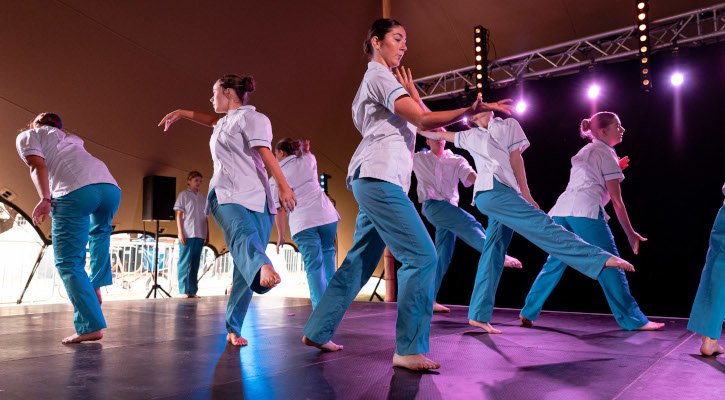
Bristol Harbour Festival 2024 - Image Credit: Amy Fern
We were delighted to be welcomed back to programme the vibrant dance stage at this year's Bristol Harbour Festival - one of the biggest events in the city welcoming over 250,000 visitors across the weekend.
'This cocreated dance piece has been a wonderful creative project that brought dancers together from different backgrounds from across Bristol to create a unique, emotive piece' - Penny Marie, Dance Workshop Facilitator
Taking over the stage in Queens Square, we platformed a huge range of dance styles and traditions present in Bristol’s dance community; from Indian to Irish Dance, Voguing to Turkish Belly Dancing.
Some highlights from the weekend included Anna K, Bristol Ballroom Community, D-Wild Fitness and RSVP Drummers. We also platformed established resident dance groups based at The Trinity Centre, such as Gerry’s Attic, a dance group for older people who rehearse at Trinity every week.
In the lead-up to Bristol Harbour Festival, we commissioned Dance Facilitator, Penny Marie, to lead a series of participatory dance workshops in which attendees co-created a new dance piece to be performed at the festival. Across five workshops dancers of all abilities and backgrounds collectively devised a 15 minute dance piece entitled 'Our Light Within' that they performed on the Saturday of the festival.
Alongside this, HYPE Dance, who offer weekly street dance sessions at Trinity, hosted the Ultimate Dance Championships 2024 – a competition open to all dance styles for ages 12 and above. Winners of this competition showcased their dancing skills in front of the Harbour Festival audience and a panel of judges that included professional dancers Bethany Kyle, Tesleem Adeyemi and Candice Scott. Alongside this, HYPE brought performances from Lil Hype, Hype Dance and Hype Carnival Squad.
We wanted to say a massive thank you to everyone who made the takeover at Bristol Harbour Festival 2024 such a success; from the facilitators, the talented dancers, the technical team behind-the-scenes, our partners Movema, Gerry’s Attic and HYPE Dance, and of course to everyone who came along to watch the performances and support dance in Bristol.
Programming the Dance Stage is one of the many ways we are creating pathways for communities to connect and celebrate together though culture. Click here to find out more.
Free activities in Old Market
Free activities in Old Market
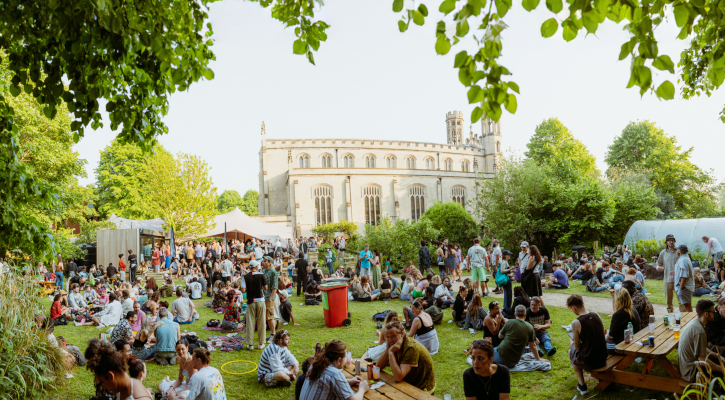
Trinity Garden Party 2024 - Image Credit: Alastair Brookes
We are very happy to announce we are one of three organisations to be awarded funding to deliver free culture and events activities in the city centre, between summer 2024 and February 2025.
“We are absolutely thrilled to receive this grant and to be recognised as the anchor organisation to bring together the diverse communities that make Old Market such a vibrant neighbourhood to visit, live and work in” - Jen Farmer, Arts Engagement Manager, Trinity Community Arts
Compass Presents, The Invisible Circus and Trinity Community Arts have each received £40,000 of funding from Bristol City Council to be the lead organisations to produce and manage activities in three areas of the city centre: Christmas Steps, Old Market and Stokes Croft.
This grant highlights the focus of our work over the last few years to proactively connect and engage with our hyper-local communities in arts and cultural activities, alongside our live events programme that boosts the local economy. With this grant we can build on our reputation producing high quality arts activities by co-designing an exciting and meaningful programme in partnership with our trusted local partners bringing together artists, residents and small businesses to maximise our collective potential.
The ongoing aim of the programme is to attract more people into the city centre to help support the local economy, businesses and the culture and events sector by showcasing Bristol’s reputation for creativity and arts.
We will be announcing more details about the events in the coming weeks.
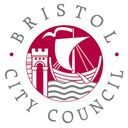
Miriam Margolyes Visits Jacobs Wells
Miriam Margolyes Visits Jacobs Wells
Acclaimed actress Miriam Margolyes took time out of her busy tour schedule to visit Jacobs Wells Baths, showing her support for the ongoing recovery efforts of this historic building. As an early supporter of the campaign, and a patron of Trinity Community Arts, Miriam's visit highlights the importance of restoring Jacobs Wells as a vital community and cultural heritage hub.
“I’m thrilled to have a chance to visit Jacob’s Wells Baths and encourage the Council and my fellow-supporters with their exciting plans to return this listed building to the service of the local Community. This will help so many to have a go - opportunity knocks at last.” Miriam Margolyes
During her visit, Miriam Margolyes met with our team and some of the professional team from PH3 Design who have developed the recently approved planning scheme to restore the space. Planned works include a street-facing main entrance and modernisation of the previously unused ground floor Pump Room, transforming it into a new cafe-bar and studio.
Miriam's visit comes as we complete key milestones for the project, including securing planning and lease completion. This means we can now begin crucial Phase 1 Repairs including works to the main hall roof, funded by £1.6 million secured from the DLUHC Community Ownership Fund and match funders.
We are excited to now be able to move forward with our efforts to bring the building back into use as a multidisciplinary venue for arts, heritage, youth, community and educational use.
We want to give thanks to everyone who has so far shared in our journey to make this vision possible, including our Patron Miriam, Bristol City Council, local stakeholders and the Hotwells & Harbourside Community Association, who led campaign efforts to save the building from disposal.
Completion of the 35-year leasehold is still to be confirmed by asset owners, Bristol City Council.
Find out more about our Jacobs Wells mission:
- Discover our vision for the building to be restored and reopened
- Learn about our Community Asset Transfer offer by Bristol City Council
- Donate to our Fundsurfer to help raise much needed funds for our phased plans to restore the building
Oh Miriam! Live is at Bristol Beacon, 12th July – Click here for tickets
In Conversation: Anjali Prashar-Savoie
In Conversation: Anjali Prashar-Savoie
In partnership with St Pauls Carnival, Citizens In Power and West of England Combined Authority we are delivering a Citizens’ Assembly for Culture in 2025.
This ground-breaking initiative will bring together people from across the region, to meet with creative practitioners, cultural providers and decision-makers to shape the future of a cultural delivery plan for the region.
We have recently recruited Anjali Prashar-Savoie as the Citizens’ Assembly Producer to help with the successful delivery of the Assembly. We caught up with her to find out more about the project that will take place in 2025.
Q: Hello Anjali! Can you tell us a bit about yourself and how you’ve come to be the producer of the Citizens’ Assembly.
A: I've been working in the cultural sector and in nightlife with a focus on grassroots culture, community organising, and creating spaces that prioritise people, equity, and access. I'm really passionate about how culture can drive new forms of social and civic participation, especially given the current political, environmental, and social challenges that we collectively face.
This experience led me to the Citizens’ Assembly Producer role. I'm grateful to contribute to something that represents the kind of systemic change we need in both culture and society as a whole. Often, we know what challenges we face in culture and beyond, but practical moves towards solutions can be difficult to organise at scale. The Citizens’ Assembly stood out to me because it offered a practical model for doing culture differently.
Q: What has your experience been of the job so far?
So far, I've been connecting with cultural workers, organisations, and grassroots organisers to get people involved in the project and understand how Citizens' Assemblies can be useful. I'm also working on expanding a wider Citizens for Culture network to make sure that the Assembly is shaped by the people it serves.
Q: You’re currently working on connecting with other cultural organisations and individuals in the region over Citizens For Culture. Why would you encourage people in the cultural sector to get involved with the project?
The sector is filled with incredible talent and group efforts that make for an exciting and diverse culture. However, sometimes the work on the ground doesn't trickle upwards into decision-making and policy. On top of that, a lot of the cultural sector is made up of freelancers who work somewhat disconnected from each other, meaning we work in silos.
Engaging with Citizens for Culture will connect people interested in citizen or community-led culture. This means you can expand your network, share information, skills, and resources, participate in upcoming workshops, and contribute to collective advocacy efforts to influence policies and secure better support for culture in the region. It provides an opportunity to build meaningful relationships with citizens and other cultural workers, creating a collaborative community with shared goals of doing things differently.
Citizens for Culture also connects you with the Citizens’ Assembly set to happen early next year. We are looking for people in the cultural sector to become associates of the assembly and help guide what happens next. By engaging with this project, together, we can make sure your voice is amplified to shape the Assembly, and that the outcomes of the assembly are supported. Overall, this is a region-wide collaborative project that is worth being a part of because the process and outcomes will be determined by the people who join.
Q: Anything else you would like to add?
We are offering online information sessions over the summer to learn more. The sessions will cover what a citizens’ assembly is and how you can get involved. In these sessions, we will also be seeking your input into our upcoming workshop series that will run throughout the Autumn.
Additionally, I love to chat. If you are a creative, cultural worker, venue, organisation or community organiser in the region, I would love to hear from you. Please feel free to reach out to me directly to chat about all things culture, community and citizens' assembly.
Find out more about the Citizens' Assembly for Culture project:
- Sign up to an online information session with the Citizens' Assembly team
-
Email Imogen@trinitybristol.org.uk to join our Citizens For Culture mailing list
-
Read Edson Burton’s opinion piece of why voting matters in this series about civic participation
-
Read our blogs to find out more about the Citizens' Assembly project
Opinion: Voting matters
Opinion: Voting matters
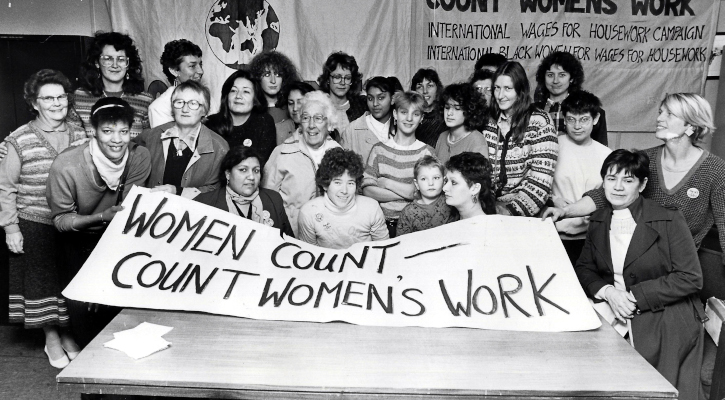
1985 Oct 25 International Time Off for Women Day, credit Evening Post, collected as part of Art of Resistance
Trinity is committed to creating ways in which citizens can take an active role in shaping arts and culture. In 2025 Our Citizens Assembly for Culture, created, in partnership with St Pauls Carnival and Citizens in Power will take place, offering people living in the West of England Combined Authority region the opportunity to actively shape the arts and cultural experiences that matter most to them and their communities.
As part of this commitment we are connecting with leading voices in the cultural sector to ask them to share their thoughts on the different civic and democratic tools that we as citizens can access. In the first in our series of opinion pieces exploring civic participation Dr Edson Burton, Curator at Trinity, reflects on the role of voting in democratic decision making.
"The Bristol Bus Boycott, the Gay Rights Movement, the Disability Rights Movements of the 1960s-1990s. These campaigns or movements have led to legislative changes that have, in turn, transformed our social attitudes"
Opinion: Voting Matters, Dr Edson Burton
‘Politics time again, are you gonna vote now?’ lamented the reformed Buju Banton, alluding to the lethal elections of his native Jamaica. But the question could equally be applied to the forthcoming British election. During the last General Election (2019), 67% of the population voted, up from the all-time low of just over 59% in 2001.
While that figure is on the rise, it still means that over 30% of the population has no say in how they are governed. According to a recent YouGov poll, the reasons given for not voting include a lack of access to polling stations, ineligibility, and no forms of ID. However, the most prominent reasons are a lack of trust in politicians and a feeling that voting will make little difference.
One might argue that cynicism is rife in politics, with pledges that are misleading if not downright dishonest. It has ever been thus, but in a crowded information world, voters may become so confused as to become indifferent.
Perhaps the dance of truth owes as much to us as to our politicians. Few would jump for joy at the thought of higher taxes, but without increased taxation, how can we fund our troubled public services, invest in green technology, or ensure education offers opportunities for all?
Responding to concerns over national identity, political parties offer a raft of immigration control measures that, if implemented, would lead to a national staffing crisis. Yet, to extol the virtues of immigration is to risk electoral suicide.
The convergence between the main political parties may also fuel voter apathy. "There's no difference between them" is the often-heard lament. Despite the barbs and bites, there appears, at times, to be more that unites than divides the main parties. They vie to expose the actual commitment to an agreed-upon agenda rather than the agenda itself.
But it is worth remembering that this consensus is the result of political participation. The impetus to secure or woo working-class votes in this election is a result of the extension of the franchise beyond a small property-owning class. Once enfranchised, all parties have had to take seriously the interests of a wider range of citizens with divergent interests and lives. Further franchise expansion was not some benign gift of a ruling class but the result of blood and guts campaigns by working-class men and women. Think Chartists, Unions, the Suffragettes.
What is the point of voting if you cannot meaningfully participate in society? If your race meant you could be legally denied access to jobs or employment? If your gender meant you were denied promotion, let alone equal pay? If your sexuality or sexual identity could lead to your imprisonment?
Such was the case prior to major civil rights campaigns: the Bristol Bus Boycott, the Gay Rights Movement, the Disability Rights Movements of the 1960s-1990s. These campaigns or movements have led to legislative changes that have, in turn, transformed our social attitudes.
Broadly speaking, all our political parties have arrived at baseline of inclusivity consensus. In recognition of new voting demographics and the reputational damage of appearing to be illiberal parties may wish to appear to be race, gender, and disability friendly
But how safe is this consensus? Is it a pragmatic concession to the present while some hanker for an illiberal past? The USA has recently demonstrated the danger of complacency as civil rights advances have been eroded by reactionary forces. Could the same thing happen in England? Perhaps if it is electorally beneficial, but certainly not if it is electorally damaging. It could only be so if we vote or hint that our vote is for the preservation of our rights.
Beyond preserving our rights, further changes that we want to see in society will inevitably involve legislation, which in turn will involve exerting pressure upon politicians. The time scale of change may not suit the urgency of our demands, but rather than lose heart, we must continue to exert political pressure through campaigning and ultimately through the ballot.
Not voting is a verdict on politics, but it cannot lead to change; rather, it will maintain the status quo. In the calculus of win or lose, only voters and their interest's matter.
Vote.
Find out more about movements that have shaped society by exploring our interactive heritage timelines
Community Connectors
Community Connectors
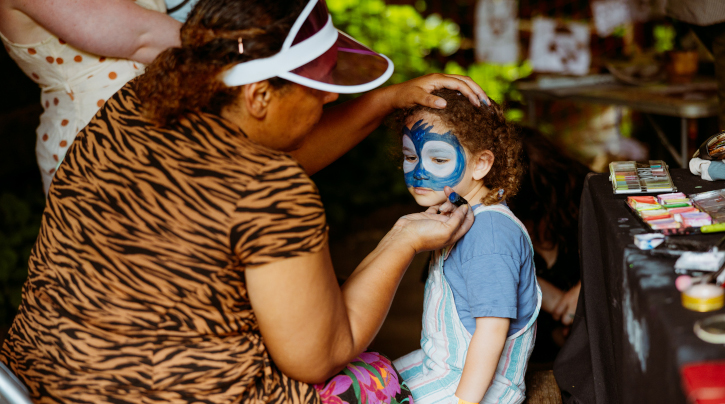
Trinity Garden Party. Photo Alastair Brookes
Over the last year, we have developed our Community and Neighbourhoods programme in response to the needs and interests of residents, community groups, and grassroots organisations.
“I’m really looking forward to connecting with the residents of Newtown. The weekly sessions will be a place where people can share their skills and interests and socialise together” Shanti, Community Connector
We have created three 'Community Connector' roles to connect with communities within the Newtown area, families who live on or near Stapleton Road, and people who access services at the Wild Goose Cafe.
Shanti Pant is the Community Connector for Newtown, a neighbourhood directly opposite the Trinity Centre. As with all the Connectors, Shanti has an active presence in Newtown both as a local resident and in organising community events alongside her daughter, Hemlata.
Originally from Nepal, Shanti has lived in Newtown since 2019. Having grown up in the countryside, she is keen to bring activities to Newtown that connect people to nature and organise weekend events for children and families. A keen craftsperson she wants to use these skills to offer activities for people who may be experiencing loneliness and isolation, providing opportunities to connect through creativity and craft.
In the first few months as a Connector, Shanti has been working with Trinity’s Communities and Neighbourhoods team to plan workshops inviting local residents to join artist Benoit Bennett in designing a mural to celebrate Newtown and the communities who live there. She also attended workshops led by the University of Bristol at their Wellspring Micro-campus in Barton Hill. These workshops explored ways in which older adults can use film as a creative medium – something that Shanti is keen to explore with local Newtown residents.
Alongside this, Shanti has been connecting with residents and community organisations, including Lawrence Hill Health Centre, to create two new free-to-access activities for Newtown residents that will start in June 2024.
Nature in Newtown is a series of weekly nature walks where local residents are invited to explore the area and take part in gentle movement activities. Initially led by facilitator Subitha Baghirathan, the sessions will then move on to exploring how to use simple creative film techniques as a way to capture and express participants’ experiences of engaging with this activity.
Shanti will also be hosting drop-in Coffee Morning sessions in Rosevear House every Friday morning from 10am to midday, starting on 4th June until 5th July. These meetups will include creative activities and the opportunity for residents to connect with each other.
If you are a Newtown resident and you have an idea for creative activities in your community you can speak to Shanti by:
- Attending a coffee morning or joining a nature walk
- Calling Trinity on 0117 935 1200
- Sign up to our mailing list
Community Connectors and our Community and Neighbourhoods programme has been developed in response to our pledges, click here to find out more.
Dance Returns to Bristol Harbour Festival
Dance Returns to Bristol Harbour Festival
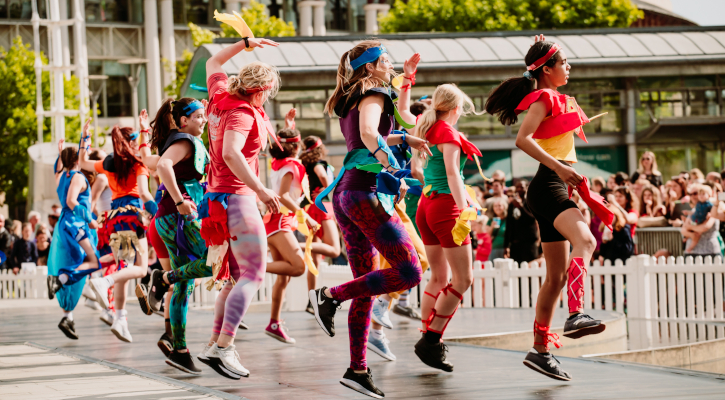
Harbour Festival 2019 - Image Credit: Alastair Brookes
Trinity is commited to creating spaces to celebrate and engage with different types of artforms. This is why we have teamed up with Harbour Festival to bring back the dance stage at this year's festival, programming a stage in Queen Square 20 July.
On Saturday, Trinity will be curating the stage, followed by Movema – an award-winning dance company – taking the reins on Sunday. This year's dance programme is more inclusive and representative than ever before, celebrating Bristol's diverse community through an array of talents and styles.
As always, we'll be collaborating with local dance companies, community groups, independent artists, and cultural organisations to showcase the rich tapestry of dance talent Bristol has to offer. We will also advocate for dance across the city, featuring open access and free-to-attend dance workshops leading up to the festival, ensuring dance is accessible to all.
We are thrilled to announce that Penny Marie will be our dance facilitator for Harbour Festival, working with the community to co-create a dance piece for Bristol through community workshops. Additionally, Trinity residents Hype Dance, an urban dance group for young people, will unveil their Ultimate Dance Championships 2024 – a competition open to all dance styles for ages 12 and above, giving contestants the opportunity to perform in front of a live audience at the Harbour Festival and win exciting prizes!
Our programme boasts an incredible lineup of dance groups, featuring long-time collaborators with Trinity: Gerry's Attic, a regular dance class for over 55s; Anna K, a Turkish belly dancer who led performances and workshops at our Garden Party on 12 May; Bristol Ballroom, a queer-led collective known for their vogue balls at Trinity and previous Harbour Fest performances; and Kennedy Muntanga, a professional dancer presenting his new work ‘Hare and Lion’. We are eager to unite these established partnerships, promote fresh work, and provide a platform for these talented dancers at one of Bristol’s biggest events of the year.
Half term activities
Half term activities
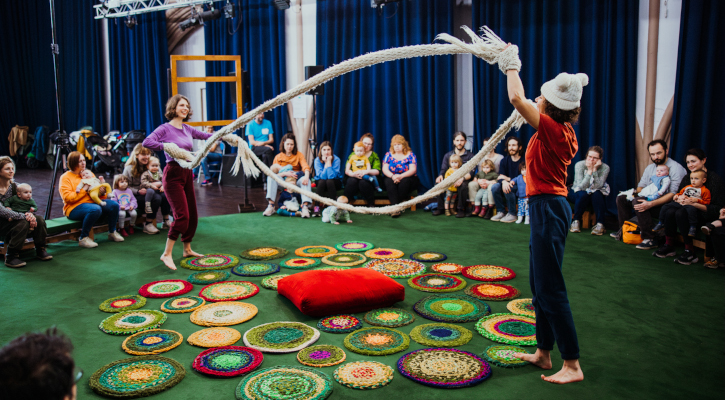
Igloo - Image Credit: Alastair Brookes
This May Half Term, we’ve got an exciting programme of activities and events for children and young people of all ages to get involved with at Trinity.
Wednesday 29 May - Friday 31 May – Speak Out
Our Speak Out workshops continue on Monday, offering young people aged 16-18 free workshops and the chance to create a performance piece with the guidance of Kabbo Ferdinand – an African Indigenousness storyteller and musician, and Natasha Gatward an immersive performance artist and eco-conscious costume designer.
Wednesday 29 May – Music Masterclass: Hodge
Music Masterclasses are back on Wednesday 29th May. This month, young people aged 16-25 are invited to a free production workshop with Bristol-based DJ and Producer Hodge, who will share their approach to producing which involves finding sounds, processing them, and creating loops and ultimately overcoming writer's block while finding methods to create music in an organised way.
Thursday 30 May – Next-Gen Sounds
Next-Gen Sounds continues as normal during the half-term, with young people aged 14-25 invited to Trinity to take part in group drop in music making sessions led by Trinity and Off The Record.
Friday 31 May – Stay and Play
Children aged 0-5 & their families are invited to Trinity to play, learn and have fun together in our Friday Stay and Play sessions, delivered in partnership with the Health Visiting team. Come along to play, sing, share stories and enjoy the beautiful gardens.
Sunday 02 June – The Fairy Forest
Head to Trinity on Sunday to explore a forgotten woodland world, filled with fairies, forest sprites and mystical beings in ‘The Fairy Forest’ a new children’s theatre show from Tidal Tales, suitable for ages 3 and up.
Click here to learn more about our programme of activities for children, young people and families.
Garden Party 2024 Recap
Garden Party 2024 Recap
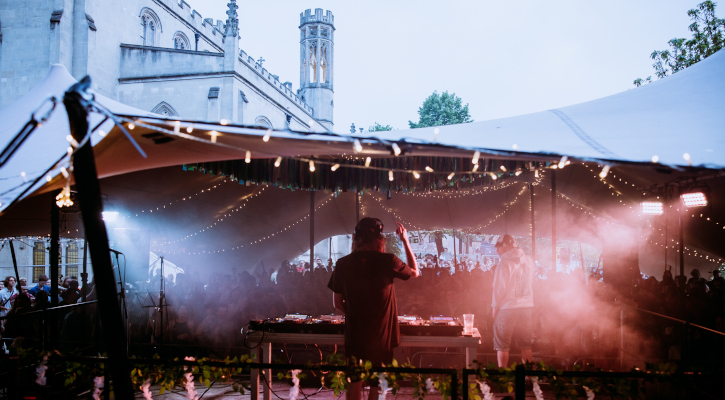
Garden Party 2024 - Image Credit: Alastair Brookes
On Sunday 12 May, we opened our gates once again for Trinity Garden Party – our, free annual day party, celebrating the start of the summer through music, dance and arts.
"It was a fabulous day - thank you to Team Trinity and everyone involved!" - Audience Feedback
In our outdoor venue, The Den, we programmed a diverse range of live music and DJs from across Bristol and The South West. The young musicians from our Next Gen Sounds programme kicked off proceedings, showcasing their musical talents that they’ve honed during the sessions. Following on, we had beautiful acoustic Folk from Eva Penney, groovy Latin rhythms from Los Gusanos, Moroccan Gnawa from Mohammed Errebba, and live Hip Hop from Komposa. Later on in the evening, DJs brought the energy, with an eclectic world music selection from Kesh, amapiano and UK Funky from Josephine Gyasi, and finally Selecta J-Man and Rider Shafique finished things off with a heavy selection of Jungle and Drum and Bass.
Inside, The Main hall was buzzing with performances from our resident dance group Hype Dance, a Turkish Belly Dance circle from Anna K, and finally The Greenbank Ceilidh Collective led the dance with a joyous ceilidh. Upstairs, Fyfe Hall hosted a range of creative craft workshops to keep the young ones busy.
We wanted to say a massive thank you to all who made Garden Party this year such a success; from the talented artists, workshop facilitators, stall-holders, local food vendors, the dedicated sound and lighting team behind the scenes, our hardworking bar staff, the entire Team Trinity, and, of course, all of you who joined us on the day. The event saw our largest ever turnout, with over 3,500 attendees, and thanks to your generosity we raised over £5000 in donations, allowing us to organise more community events like Garden Party as well as supporting our charitable mission of making the arts accessible to all. Garden Party just keeps getting bigger and better, with a 60% increase on last year's attendees, and a 65% increase on last year's donations. Thank you for coming down to support what we do and celebrating music, dance and the arts.
If you'd like to continue to support Trinity, click here to make a donation.
Celebrating local and community history month
Celebrating local and community history month
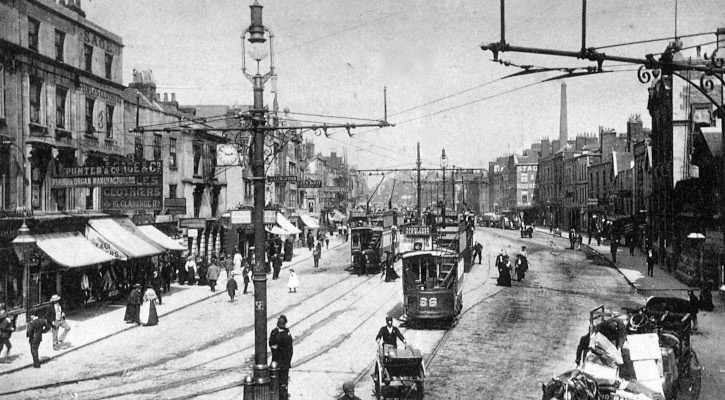
Old Market Bristol
May is Local History month, so to celebrate we’ve been looking back at our heritage project, Vice and Virtue, that documented the rich history of Old Market in East Bristol, where The Trinity Centre calls home.
Early History
Old Market is an ancient marketplace which once stood outside the walls of the Old City and served as a main thoroughfare for goods arriving from London into Bristol.
The area contains some of Bristol’s oldest buildings, with over 60 listed buildings including the Methodist Central Hall, The Palace Hotel, and – of course – Holy Trinity Church, aka The Trinity Centre.
Following the demolition of Bristol Castle in 1656, the area was redeveloped and stone from the castle is said to have been used to repave Old Market Street, with many of the original 17th century building frontages remaining to this day.
Old Market Street was a thriving centre for trade in meat and vegetables, as well as being home to an assortment of small industries specialising in the production of farming utensils, as well as several brewers, maltsters, and public houses.
Industrial Revolution
The Industrial Revolution radically transformed Old Market, with major new businesses attracting workers from across the South West. New opportunities for employment led to East Bristol’s rapid urbanisation during this period. By 1881, the population of St Phillips rose from approximately 8,000 in 1801 to 50,000.
Religion was seen as a major civilising force that followed rapid urbanisation, and as such, many churches were built in these expanding urban areas. One such church was Holy Trinity Church, now The Trinity Centre, which was built between 1829 and 1832 by Thomas Rickman and Henry Hutchinson, two architects from Birmingham and seated 1,500 people.
The new railway added to the hustle and bustle of Old Market. Traffic increased significantly when an electric tramway was introduced in 1876. Unsurprisingly, the street market struggled to coexist with the tram network, and the market ceased to operate during the 19th century, which signalled the start of rapid change in the area.
The Golden Years, 1900-1939
Old Market Street, with its transport links, entertainment centres and range of shops, was an important and vibrant part of Bristol. The first 30 years of the 20th century were marked by a series of bold new development, including The King’s Cinema, The Methodist Central Hall and The Empire Theatre, catering to a new appetite for culture and the arts. While the traditional street market from which Old Market gets its name had faded out during this period, in its place came a range of new stores and retail businesses.
Old Market was part of the ‘golden mile’ of streets that stretched from Lawrence Hill to the City Centre, with a diverse offering of shops attracting visitors from far and wide.
Decline and Rejuvenation
Bristol breathed a sigh of relief after the Second World War, in which the city’s Historic City Centre was decimated during the Bristol Blitz, with Castle and Vine Street being flattened by bombings. However, across the city, including in Old Market, life did not return to normal immediately, with essential food items subject to rationing until 1954.
After the Second World War, Old Market had become increasingly isolated and sidelined. Now Castle Street was no more, Old Market stood on the other side of a bomb site which many Bristolians feared to cross. The electric trams ceased operation in 1941, and by the 1950s, St Philips Station was closed to passengers, further isolating the area.
The bombing of Bristol’s historic centre led to new approaches to housing, in particular high-rise flats of the 1950s, which dramatically changed the face of St Jude’s and Old Market. Old Market also had to compete with the newly built Broadmead shopping centre. The development of the ring road and roundabout as part of the 1966 Development Plan further isolated Old Market from the rest of Central Bristol. Within a dozen years, the ‘high street’ atmosphere of Old Market had all but disappeared, with a dramatic decrease in footfall in the area.
However, the idea that Old Market went into terminal decline after the Ring Road masks a more complex picture. Old Market’s isolation opened a space in which new cultures and subcultures emerged. Since then, Old Market has becoming a bustling centre of nightlife and culture, becoming a home for Bristol’s LGBTQ+ community, alongside a new and diverse offering of restaurants, bars and clubs. With one of the fastest growing populations in Bristol, Old Market’s future seems to be one defined by its eclectic mix of cultures and lifestyles.
Click here to explore Trinity's archives to find out more about the history of The Trinity Centre and Old Market.
This news item is based on information gathered as part of Trinity's Vice and Virtue project.
In Focus: Co-creating an arts-based community offer
In Focus: Co-creating an arts-based community offer
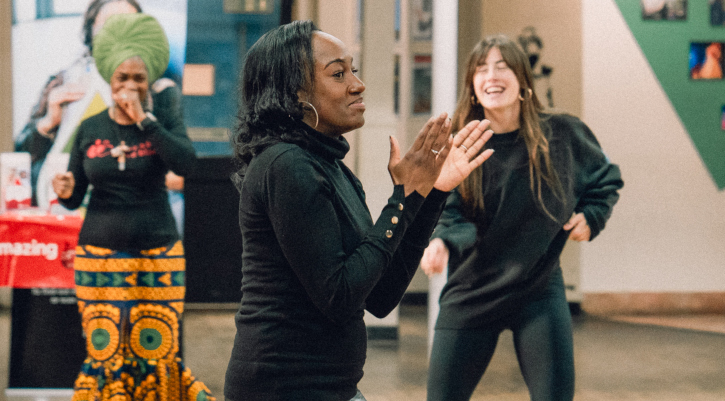
Image Credit: Megan Ip
We caught up with Arts Engagement Manager, Jen Farmer, who is leading on the Community and Neighbourhoods programme to find out more about how she has been working with people living in the locality to co-create an arts-based community programme.
"It’s important for us to work in this way so that we’re not doing things ‘to’ people, or making assumptions about what people want or are interested in. Instead, we hope that this approach will enable us to build meaningful connections and understanding with our most local residents" - Jen Farmer, Arts Engagement Manager
You started in the role last year - what have you been up to since joining the Trinity team?
I started out by exploring the hyper-local neighbourhood (neighbourhoods within a 0.5 mile radius of Trinity), connecting with residents, community groups and grassroots organisations to understand the work that is already taking place and their current and historical relationships to Trinity.
I spent a lot of time listening as I wanted to make sure that what is created responds to need and builds upon the already brilliant work and activity that is happening around us.
Connecting with the Trinity team we hosted a series of workshops to help build an interactive online map that allowed us to see the connections between the people and organisations that offer community activities and support. From this, we have created a hyper-local network of people who are delivering and offering services in East Bristol.
I've been working closely with the team at Trinity to help support community-led groups to deliver regular affordable activity at the centre. This has included supporting All Ah Wi to host quarterly sessions for local women, including a takeover day for International Women’s Day.
What have you learned along the way?
I’m continually learning. Everybody has the potential to surprise you, with an interest, or a skill, something they’d like to explore or share. Listen, share, don’t make assumptions, and be respectful of people’s time. Building trust and relationships takes time, and connection with individuals is just that – individual!
‘Co-creation’ what does that actually mean, and why is it important to work in this way?
A: Co-creation describes a collaborative process: a way of approaching and exploring something where everyone involved is part of decision-making, rather than one person, or organisation taking the lead.
For us, this means sharing control and ensuring everyone is part of the conversation. It’s important for us to work in this way so that we’re not doing things ‘to’ people, or making assumptions about what people want or are interested in. Instead, we hope that this approach will enable us to build meaningful connections and understanding with our most local residents, and support activity that people feel real connection to, and ownership of. The aim is that, over time, we build trusted relationships where all our activities and programming is informed by our local connections.
What is next for the Community and Neighbourhood Programme?
We have secured funding to support three 'Community Connectors’ with target outreach that will focus on: Elders and intergenerational practice in Newtown, individuals experiencing food and housing insecurity in St Judes, and women who live and socialise around Stapleton Road, one of our most local high streets.
The connectors, who all live locally, will provide an important bridge between communities and Trinity. We’ll work together closely over the coming months. I will be support and follow their lead, offering guidance and expertise to help the connectors shape a programme that responds to needs and interest.
How can people get involved?
- Look at our What’s on section in the website to get involved in regular groups here such as Women of Colour and Ecstatic Prance.
- Sign up to volunteer with our gardening sessions.
- Join us for our May Garden Party, or volunteer at it.
In Conversation: Rob
In Conversation: Rob
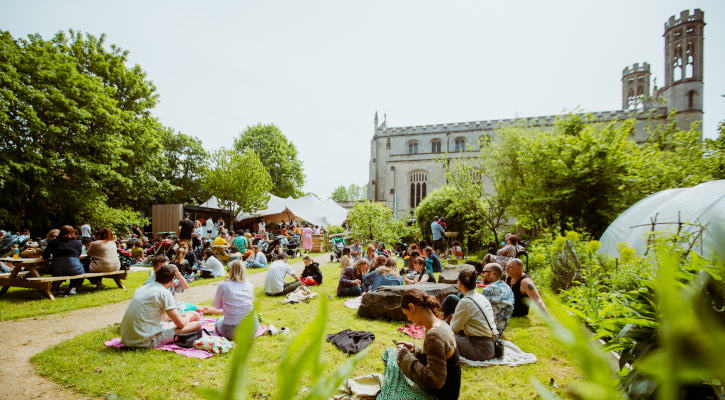
Trinity Garden Party - Image Credit: Alastair Brookes
From fortnightly volunteer sessions in our community garden, to supporting free community events such as Garden Party, volunteering is a vital part of supporting what we do.
We spoke to Rob, one of Trinity's longest-running volunteers, about how he got involved with Trinity and to find out more what it is like being a Trinity volunteer.
"Volunteering at Trinity helped me gain skills and meet people that I otherwise would never have had the opportunity to. My day job is very different, so it’s always a refreshing change to help out with the music and community events I’m passionate about" - Rob, Volunteer
Q: Hi Rob, tell us a little about yourself
A: I’ve been a volunteer, on and off, for about six years or so. I started in 2017 helping on reception every Saturday. I had that role for about two years. Nowadays, I volunteer with events just as and when I can. I always try and make time for the Garden Parties though!
Q: How have you benefited from volunteering at Trinity?
A: Volunteering at Trinity helped me gain skills and meet people that I otherwise would never have had the opportunity to. My day job is very different, so it’s always a refreshing change to help out with the music and community events I’m passionate about. I would recommend it to anyone!
Q What have been your favourite events to volunteer at?
A: Anything community focussed I would say. The Garden Party is an obvious choice because it’s such a fun day to be involved with, but I helped with loads of different events when I was on reception. Weddings were always really special days, and Caring at Christmas was great to be a small part of.
Q: Any stand-out memories of volunteering at Trinity you’d like to share?
A: Helping to find an emergency gas safe engineer to install the new cooker a day before Caring in Bristol were due to cook literally hundreds of Christmas meals was daunting, but so satisfying to see it work out in the end. The person we found held up their holiday plans and didn’t even charge, they were just happy to help a great cause.
Also, seeing people return to Trinity after covid for the garden sessions was wonderful to witness. The Den has become a returning feature too, which is great! It’s been nice to see the centre evolve over the years. It’s a really important space for Bristol.
Q: Why should people volunteer at Trinity?
A: The Trinity team are great, working with them always makes me want to help out more. To be part of the team and help deliver the events, I find really rewarding. Guest list for some of the amazing gigs there is a nice perk too!
We are currently looking for volunteers to help out with our Garden Party on Sunday 12 May - click here to find out how you can get involved.
Celebrating The South West’s Global Communities
Celebrating The South West’s Global Communities
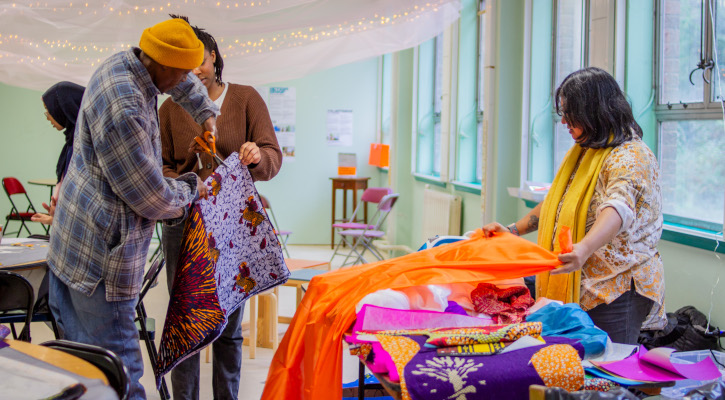
DIASPORA! Festival Flag Making Workshop
DIASPORA! Festival is a vibrant celebration of people, arts, culture, film, and more, taking place at host venues across the city on Early May Bank Holiday weekend 03 - 06 May. Brought to the South West by Diverse Artists Network, the festival aims to reflect the rich variety of talent within the south west’s global communities, with an emphasis on the creative arts that reside within these communities. Trinity is very proud to be partnering with Diverse Artist Network to bring Diaspora to Trinity, through a programme of workshops, music events and arts.
“Brilliant people, really welcoming and great level of diversity and lovely to talk to people from different backgrounds” - Diaspora! Flag Making Workshop Participant
As part of Diaspora’s engagement fringe programme in the lead up to their festival weekend, Trinity partnered up with them to deliver their programme of free creative workshops named ‘Flag Up Your Identity’. These workshops were open to all and served to unleash the creativity of the workshop participants to make a unique flag that embodied their identity and heritage. Participants were encouraged to create unique flags influenced by their cultural roots and their personal journey. Over the Easter period, Trinity welcomed over 30 participants who made wonderful flags which will be showcased at Trinity and other locations around the city.
DIASPORA! Festival continues throughout the May bank holiday weekend, kicking off with the official opening ceremony for the festival taking place on Friday 03 May 4pm – 7pm. Expect an evening of dance, music, poetry, food, and folklore, showcasing the extraordinary talents of our local community while fostering meaningful cross-cultural connections. Tickets are free, find out more here.
After the opening ceremony on 03 May, we will be hosting Pangea at Trinity. Pangea is a club night which celebrates sound system music from around the globe, bringing together a diverse range of genres including Samba, Bhangra, highlife, gospel, dancehall and much more. Click here to get tickets.
Closing out proceedings, on Sunday 05 May we have Alkebulan, African Storytelling Village, a day of African arts and culture featuring captivating storytelling to vibrant dance performances. Featuring local artists from the likes of Kabbo Hue Ferdinand, MoYah, Ian Solomon-Kawall, Penny Avery, and Mohammed Errebba, this event promises an unforgettable cultural showcase. Find out more here.
We are very proud to be partnering with Diverse Artists Network for DIASPORA! Festival, highlighting our commitment to providing accessible cultural events for the community, and a space to learn arts and crafts as well as opportunities for participants to skill share.
Performance for Children and Families
Performance for Children and Families
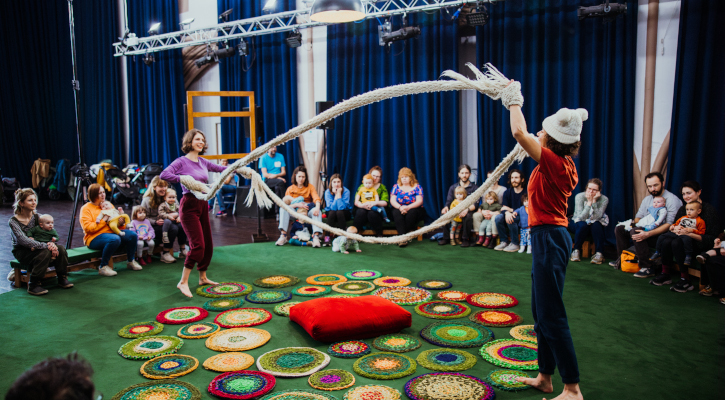
Igloo - Image Credit: Alastair Brookes
As part of our Children and Young People’s programme, we brought Igloo, an interactive early year's performance, to Trinity. Igloo was created by Barton Hill-based Travelling Light Theatre. The company created the show specifically to tour to non-traditional theatre venues with the aim of breaking down barriers to accessing theatre.
We connected with our partners, Central Bristol Children Centre, to offer children (and their grown ups) who attend the centre’s weekly Stay & Play at Trinity, the opportunity to watch the show for free. Igloo was shared in a separate space running alongside Stay & Play, allowing families to choose if they wanted to give the performance a try during a familiar group session. In total we welcomed over 100 families/carers to two performances of Igloo.
Through feedback from conversations between children, families and local community groups and building upon our pledges we are looking at ways to create a responsive programme that aims to offer young children the opportunity to take their first steps in their creative journey.
Coming up in the summer we are pleased to host theatre company Tidal Tales who will be bring their latest show, Fairy Forest: Stories from the Trees, for an outdoor performance. This follows the 'The Hare the Moon and the River' that we programmed as part of our Summer Sessions last year.
You can keep up to date with our our Children and Young People's programme here or to hear about upcoming events and activities sign up to our mailing list here




